
- Homepage
- Certification
- Composition
- Denomination
- Ae Prutah (34)
- Ae3 (14)
- Antoninianus (104)
- Ar Denarius (42)
- Aurelianianus (12)
- Aureus (145)
- Bi Double Denarius (24)
- Bi Nummus (22)
- Centenionalis (16)
- Cistophorus (24)
- Denarius (1280)
- Double Denarius (63)
- Dupondius (16)
- Nummus (120)
- Prutah (27)
- Quadrigatus (13)
- Sestertius (128)
- Siliqua (15)
- Solidus (169)
- Tetradrachm (22)
- Other (606)
- Era
- Ruler
- Antoninus Pius (54)
- Augustus (141)
- Caracalla (53)
- Constantine I (57)
- Constantine Ii (29)
- Domitian (58)
- Gallienus (37)
- Gordian Iii (62)
- Hadrian (101)
- Marcus Aurelius (69)
- Nero (114)
- Nerva (31)
- Philip I (66)
- Septimius Severus (36)
- Severus Alexander (69)
- Theodosius Ii (32)
- Tiberius (69)
- Trajan (97)
- Trajan Decius (28)
- Vespasian (78)
- Other (1615)
- Year
Roman Empire Quinctilius Varus under Augustus AE20 (4-5 AD) -NGC Ch. F Antioch
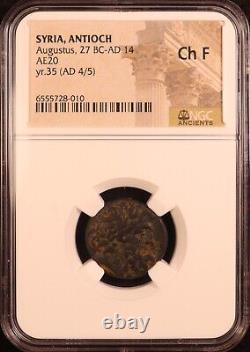

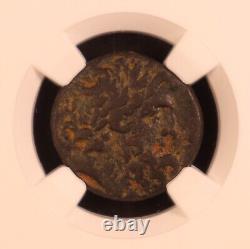
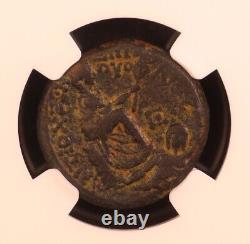
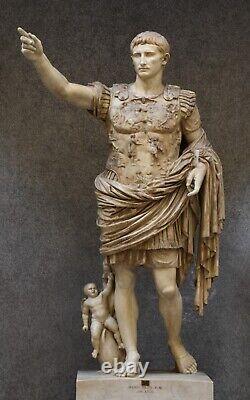
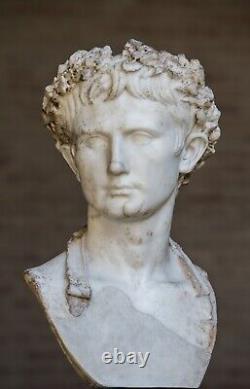
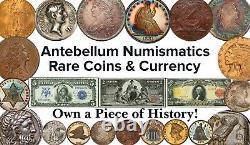



Roman Empire Publius Quinctilius Varus under Augustus AE20 (4-5 AD) - NGC Choice Fine - Antioch, Syria Provincial Issue! Laureate head of Zeus right / Tyche seated right on rock outcropping, holding palm; EK (date) to left; at feet, river-god swimming right. Publius Quinctilius Varus was consul in 13 BC (along with the future emperor, Tiberius) and governor of Syria from 7-4 BC, when this coin was struck.
He was also governor of Africa and Germania. It was in Germania that Varus suffered the defeat he is best remembered for, thanks to chieftain Arminius.
The Cherusci, and other allies, ambushed Varus in the Teutoburg Forest of northwest Germany, annihilating the XVII, XVIII, and XIX Roman legions over three days, during which Varus committed suicide. When Augustus received the news, it is recorded that he tore his clothes and exclaimed, Quintilius Varus, give me back my legions!
It wasn't until the reign of Domitian that the Romans again attempted to subdue the Germans beyond the Rhine. Publius Quinctilius Varus (Cremona, 46 BC - Teutoburg Forest, AD 9) was a Roman general and politician under the first Roman emperor Augustus. Varus is generally remembered for having lost three Roman legions when ambushed by Germanic tribes led by Arminius in the Battle of the Teutoburg Forest, whereupon he killed himself. In 8-7 BC, Varus governed the province of Africa. The Jewish historian Josephus mentions the swift action of Varus against a messianic revolt in Judaea after the death of the Roman client king, Herod the Great, in 4 BC. After occupying Jerusalem, he crucified 2000 Jewish rebels and may have thus been one of the prime objects of popular anti-Roman sentiment in Judaea (Josephus, who made every effort to reconcile the Jewish people to Roman rule, felt it necessary to point out how lenient this judicial massacre had been). Indeed, at precisely this moment the Jews, nearly en masse, began a full-scale boycott of Roman pottery (red slip ware). Thus, the archaeological record seems to verify mass popular protest against Rome because of Varus' cruelty. Between 10 BC and 6 AD Tiberius, his brother Drusus, Lucius Domitius Ahenobarbus, and Germanicus conducted long campaigns in Germania, the area north of the Upper Danube and east of the Rhine, in an attempt at achieving a further major expansion of the Roman Empire together with a shortening of its frontier line.They subdued several Germanic tribes, such as the Cherusci. In 6 AD, Tiberius declared Germania pacified, and Varus was appointed to govern it. Tiberius, who would later rule as emperor, left the region to suppress the Great Illyrian Revolt. Augustus made Publius Quinctilius Varus the first "officially appointed" governor of the newly created Roman province of Germania in 7 AD.
Battle of the Teutoburg Forest and Death. In September 9 AD Varus was preparing to leave his summer headquarters in Vetera (today Xanten) and march three legions - the Seventeenth, Eighteenth, and Nineteenth - with him to Moguntiacum (modern-day Mainz), when news arrived from the Germanic prince Arminius (a Roman citizen and leader of an auxiliary cavalry unit) of a growing revolt in the Rhine area to the West.Ignoring a warning from Segestes not to trust Arminius, Varus marched his forces behind the latter's lead. Not only was Varus' trust in Arminius a terrible misjudgement, but Varus compounded it by placing his legions in a position where their fighting strengths would be minimized and those of the Germanic tribesmen maximized - because he expected no ambush and very little trouble in intimidating the rebels. Arminius and the Cherusci tribe along with other allies, had skillfully laid an ambush, and in the Battle of the Teutoburg Forest in September at Kalkriese (East of modern Osnabrück), the Romans marched right into it. The heavily forested, swampy terrain made the infantry manoeuvres of the legions impossible to execute and allowed the Germans to defeat the legions in detail.
On the third day of fighting, the Germans overwhelmed the Romans at Kalkriese Hill, north of Osnabrück. Accounts of the defeat are scarce, due to the totality of the defeat, but Velleius Paterculus testifies that some Roman cavalrymen abandoned the infantry and fled towards the Rhine, but they were intercepted by the German tribesmen and killed. Varus himself, upon seeing all hope was lost, killed himself by falling on his sword.
Arminius cut off his head and sent it to Bohemia as a present to King Marbod of the Marcomanni, the other most important Germanic leader, whom Arminius wanted to coax into an alliance, but Marbod declined the offer and sent the head on to Rome for burial. Some captured Romans were caged and burned alive; others were enslaved or ransomed. Tacitus and Florus report that the victorious Germanic tribes tortured and sacrificed captive officers to their gods on altars that could still be seen years later. The Romans did later recover the lost legions' eagles, one each in 15 AD, 16 AD and 42 AD. Due to the shame and the ill luck thought to be created by the Roman defeat, the XVII, XVIII and XIX legions never again appeared in the Roman Army's order of battle.
The loss at the Teutoburg Forest was keenly felt by Augustus in his remaining years. According to the biographer Suetonius, upon hearing the news, Augustus tore his clothes, refused to cut his hair for months and, for years afterwards, was heard, upon occasion, to moan, Quinctilius Varus, give me back my legions! Roman historians referred to the battle as the clades Variana ("Varian disaster").
Gibbon describes Augustus' reaction to the defeat as one of the few times the normally stoic ruler lost his composure. Varus' political legacy in Rome was destroyed and the government blamed him for the defeat. His son's (the younger Varus) chances for a political career were ruined. Tiberius himself fell under severe criticism for recommending Varus as the governor of Germania. Tiberius, according to Gaius Stern, was forced to sacrifice his friend and former brother-in-law to save his career.
Furthermore, Varus himself had been one of the figures on the Ara Pacis, but the figure is lost today. Stern has proposed that common citizens vandalized the Ara Pacis by damaging Varus in anger over their lost loved ones, leaving the regime, which had blamed Varus, uncertain as to whether or not to fix the damage.
Approximately 40 years after Varus' death, a general under Claudius, Pomponius Secundus, raided Germany and by chance rescued a few POWs from Varus' army. Claudius welcomed them home after their long captivity, their stories arousing much pity. Please Check out Our Web Site : antebellumnumismatics. Please reach out to us if you have any questions about any listings you see. ALL Precious Metals tested with our own Sigma Metalytics Precious Metal Tester and guaranteed genuine.
The only exception is when items are damaged, tampered with, or removed from holders. All Bullion or Silver Sales are final as market conditions are constantly changing. Please check out our other listings!
We have auctions almost every week so make sure to follow us! Follow our owner on Instagram as well at...
At Antebellum Numismatics LLC we try to offer a wide variety of items including graded and ungraded coins from modern to bust series, paper currency, obsolete and confederate currency, exonumia such as civil war and hard times tokens, world coins such as thalers and numismatic medals, and we are always listing interesting items as well as many rare key dates. And many other interesting items like shipwreck recovered coins and Ancient coins.
We pride ourselves on having outstanding customer service. Coin grading is subjective and all coins can be interpreted differently, so we try to post very large, up close shots of each item we list.
Be sure to take a close look and come up with your own opinion! We are a family-owned small business and appreciate your business and feedback.

